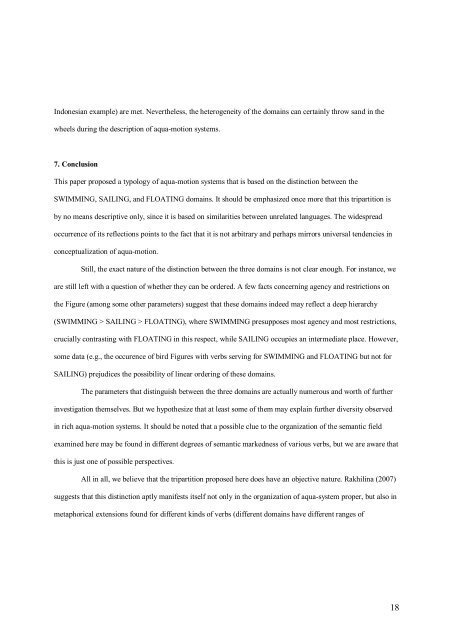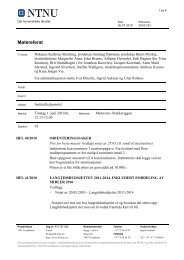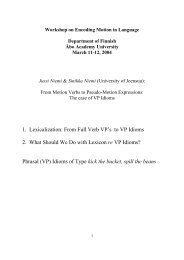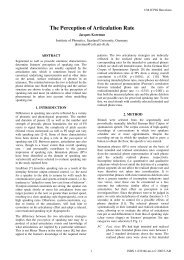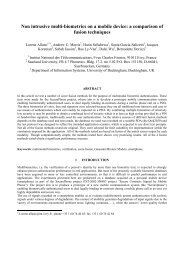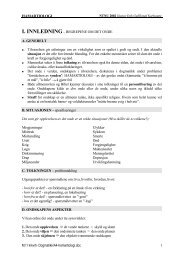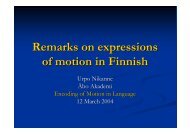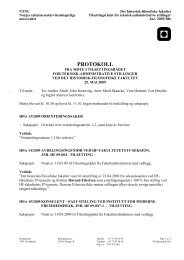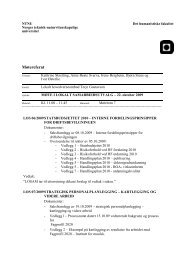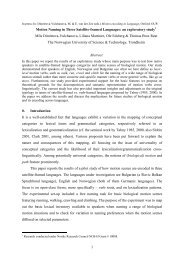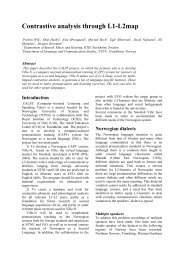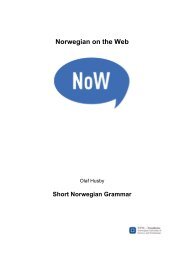Domains of aqua-motion: a case study in lexical typology Yury A ...
Domains of aqua-motion: a case study in lexical typology Yury A ...
Domains of aqua-motion: a case study in lexical typology Yury A ...
You also want an ePaper? Increase the reach of your titles
YUMPU automatically turns print PDFs into web optimized ePapers that Google loves.
Indonesian example) are met. Nevertheless, the heterogeneity <strong>of</strong> the doma<strong>in</strong>s can certa<strong>in</strong>ly throw sand <strong>in</strong> the<br />
wheels dur<strong>in</strong>g the description <strong>of</strong> <strong>aqua</strong>-<strong>motion</strong> systems.<br />
7. Conclusion<br />
This paper proposed a <strong>typology</strong> <strong>of</strong> <strong>aqua</strong>-<strong>motion</strong> systems that is based on the dist<strong>in</strong>ction between the<br />
SWIMMING, SAILING, and FLOATING doma<strong>in</strong>s. It should be emphasized once more that this tripartition is<br />
by no means descriptive only, s<strong>in</strong>ce it is based on similarities between unrelated languages. The widespread<br />
occurrence <strong>of</strong> its reflections po<strong>in</strong>ts to the fact that it is not arbitrary and perhaps mirrors universal tendencies <strong>in</strong><br />
conceptualization <strong>of</strong> <strong>aqua</strong>-<strong>motion</strong>.<br />
Still, the exact nature <strong>of</strong> the dist<strong>in</strong>ction between the three doma<strong>in</strong>s is not clear enough. For <strong>in</strong>stance, we<br />
are still left with a question <strong>of</strong> whether they can be ordered. A few facts concern<strong>in</strong>g agency and restrictions on<br />
the Figure (among some other parameters) suggest that these doma<strong>in</strong>s <strong>in</strong>deed may reflect a deep hierarchy<br />
(SWIMMING > SAILING > FLOATING), where SWIMMING presupposes most agency and most restrictions,<br />
crucially contrast<strong>in</strong>g with FLOATING <strong>in</strong> this respect, while SAILING occupies an <strong>in</strong>termediate place. However,<br />
some data (e.g., the occurence <strong>of</strong> bird Figures with verbs serv<strong>in</strong>g for SWIMMING and FLOATING but not for<br />
SAILING) prejudices the possibility <strong>of</strong> l<strong>in</strong>ear order<strong>in</strong>g <strong>of</strong> these doma<strong>in</strong>s.<br />
The parameters that dist<strong>in</strong>guish between the three doma<strong>in</strong>s are actually numerous and worth <strong>of</strong> further<br />
<strong>in</strong>vestigation themselves. But we hypothesize that at least some <strong>of</strong> them may expla<strong>in</strong> further diversity observed<br />
<strong>in</strong> rich <strong>aqua</strong>-<strong>motion</strong> systems. It should be noted that a possible clue to the organization <strong>of</strong> the semantic field<br />
exam<strong>in</strong>ed here may be found <strong>in</strong> different degrees <strong>of</strong> semantic markedness <strong>of</strong> various verbs, but we are aware that<br />
this is just one <strong>of</strong> possible perspectives.<br />
All <strong>in</strong> all, we believe that the tripartition proposed here does have an objective nature. Rakhil<strong>in</strong>a (2007)<br />
suggests that this dist<strong>in</strong>ction aptly manifests itself not only <strong>in</strong> the organization <strong>of</strong> <strong>aqua</strong>-system proper, but also <strong>in</strong><br />
metaphorical extensions found for different k<strong>in</strong>ds <strong>of</strong> verbs (different doma<strong>in</strong>s have different ranges <strong>of</strong><br />
18


